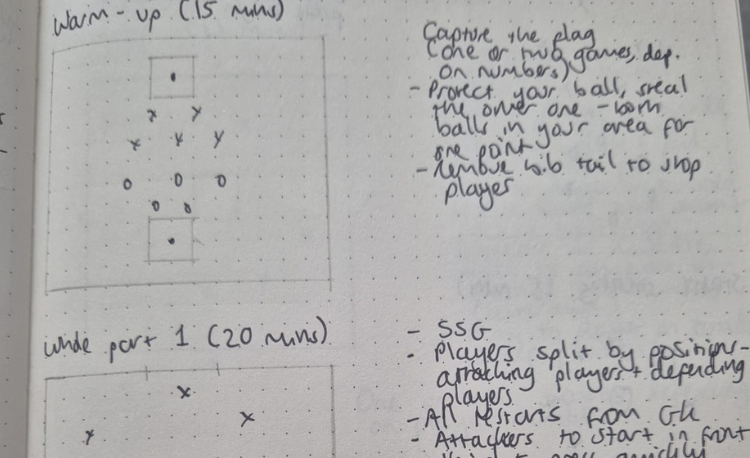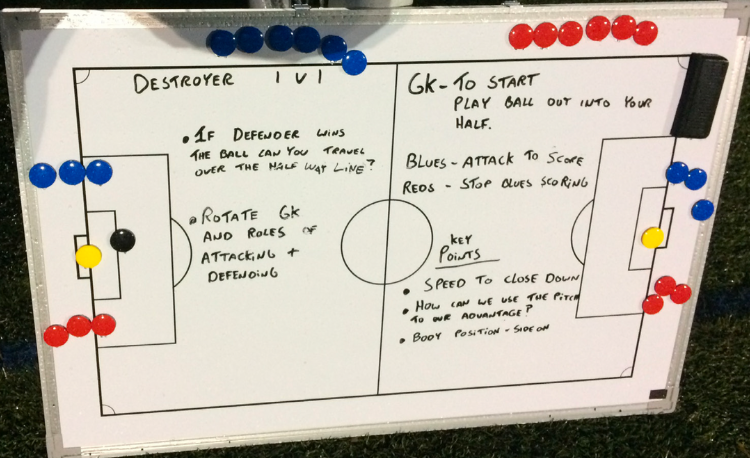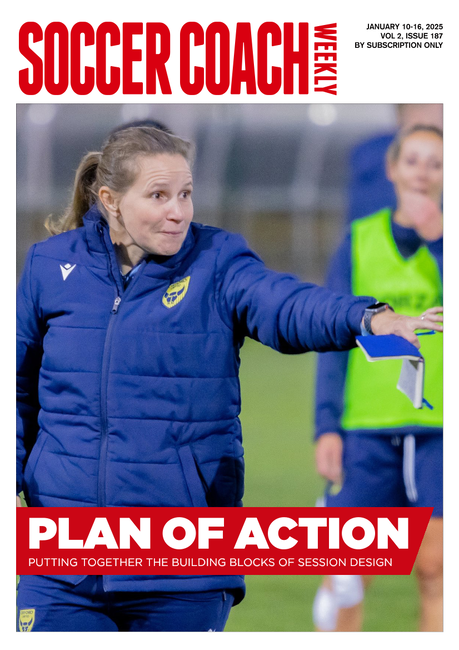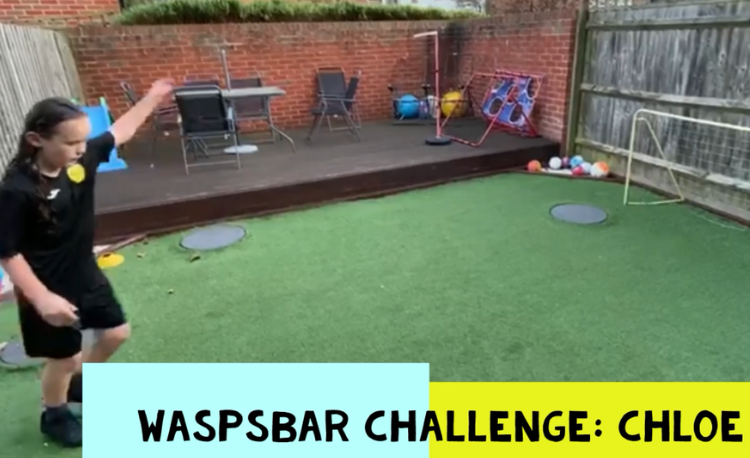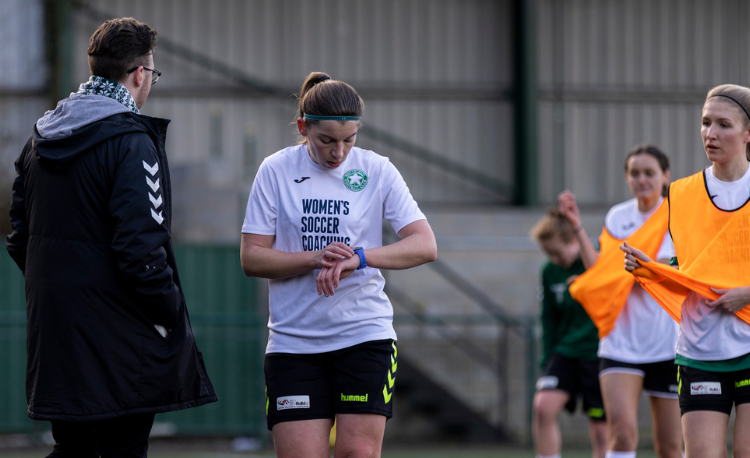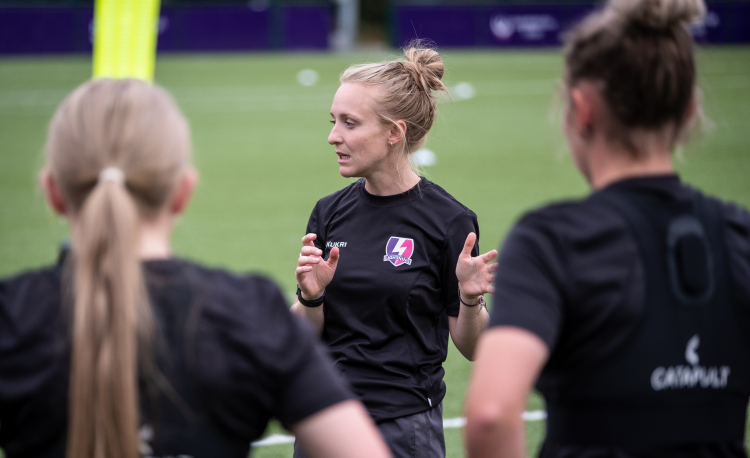The different ways to structure a soccer training session
When planning for training, consider your topic, the type of practices you’ll use and what you will need to make it work.
Planning and designing a session is arguably one of the most important roles of a coach.
A carefully designed session will both help maximise player development, and mean the coach is more prepared, which will, in turn, take away some concerns and stresses during delivery.
What does a well-planned session look like?
A well-planned session will:
- Run smoothly, helping to keep the players focused and reducing the amount of opportunities they have to lose concentration.
- Help you maximise the limited amount of time you have with your players, maximising their opportunities to learn.
- Allow players to transfer their learning into matchday, taking pictures or scenarios from their session into the actual game.
Choosing a topic
One of the main difficulties we all face when we’re planning a session is knowing where to start.
The game of soccer comprises a large number of elements. It is understandable that we want to help the players with all of them.
But, if we try and give players too much information in a small space of time, they can end up not learning anything at all.
A good principle to work to is: at the end of each session, has every player been able to take away at least one thing they have learned? If so, we have done our job.
A group of players may learn the same thing, while a few may take away a piece of information specific to them.
While it is important that players leave the session with something that helps them, it is just as vital that there is a theme to the learning.
To help achieve this, we need to have a clear focus for the session, in the form of a clear objective that you want the players to achieve.
For instance, it may be that you want your players to focus on improving their forward passing, retaining possession or understanding of how to defend in a 1v1 situation. This is sometimes called a session topic.
Once we have decided on the topic, we need to ensure that our focus stays solely on it when planning, and delivering, the session.
Then, we must decide on what practices we are going to use, based on what the players will enjoy and find challenging, and what will support them in their development of the session topic.
Choosing a session structure
As important as the practices we use is the way these practices fit together into a session.
The most effective sessions do not just have good practices, focused on the chosen topic, in which the players both learn and have fun, but they also ensure that the topic runs through everything they do on the training field.
This means that what players learn and develop in one practice can then be used and developed further in the next.
There are three ways in which you might look to structure a session. Each structure allows for the exploration of a single topic.
1. Up the steps
This is a more traditional approach to training, where the level of difficulty increases throughout the session.
Quite often, this takes the form of a warm-up; a technical, unopposed practice; a skill or opposed practice; a game; and then, perhaps, a cool-down, depending on the age group of the players.
The session topic is explored through all of the practices, including the game.
2. Whole-part-whole
The session begins with a game, which usually has some sort of rule, constraint or points-scoring system that is linked to the session topic.
The players then participate in some form of practice, that, again, is linked to the topic.
Finally, the players return to the game, where they get an opportunity to apply what they have just learned.
The rule, constraint or scoring system that was added to the first game can be removed straight away, or after a short period of time, so that it becomes ’just a game’.
3. Carousel
A small number of practices, likely three or four, are set up, and the players are split into a number of groups. This number cannot exceed the amount of practices.
Each group of players begins the session within a different practice, before rotating around all of the practices throughout the session.
Choosing practices to fit the session
Different practices can then be chosen to fill the different parts of whatever structure you choose to use.
Practices can be sorted into four different types, based on something called the practice spectrum.
- Unopposed: These are practices that don’t involve opposition. They can be solo activities, such as individual ball work, or group activities, such as passing patterns.
- Unopposed with interference: These practices involve two or more players, with the addition of interference, rather than opposition. For example, players dribble a ball around the same area, and have to avoid each other. The players aren’t permitted to tackle.
- Semi-opposed: These include opposition, but there is an imbalance in team numbers – perhaps 2v1 or 3v4 – allowing for underloads or overloads.
- Opposed: These practices include opposition, and teams are the same size. Whether a small-sided game (seven-a-side and under) or a full-size game, opposed practices are more of a classic match-up.
Different practice types serve different purposes. Typically, a mix of all types, as supported by the session structure, is most effective.
Defining practices
Within each practice, consider the following:
- Timings: How long is it going to run for?
- Area size: How big or small, wide or thin, long or short is the area? Do you just need one area, or two or three to allow you to run the same practice with multiple groups?
- Group size: How many players are required for the practice? How are you going to split the players?
- Equipment: What equipment do you need? Balls, cones, bibs?
- Rules: What do you want the players to do within the practice?
Related Files
SIX TOP TIPS FOR YOUR SESSION DESIGN
- Pick your topic by identifying what you want your players to learn.
- Stick to your topic. Make sure your session is focused, and the topic runs through every part of it. This includes your coaching points during your delivery.
- Choose a structure to slot your practices into it, allowing your session to have natural coherence and progression.
- Identify practices to use within the structure. Don’t be afraid to steal practices from other coaches (after all, we’re all just using everyone else’s ideas!) – but, if you do, consider how it’s relevant to your topic and adapt it as needed to the age and stage of your players.
- Define the parameters around each of your practices, including time, area, group size, equipment and rules.
- Consider how you will transition between the different parts of your session. This could include whether you will have a break between each part, or whether you will set up one area to easily transition into another – by removing or adding cones, for example.
Newsletter Sign Up
Coaches Testimonials

Gerald Kearney, Downtown Las Vegas Soccer Club

Paul Butler, Florida, USA

Rick Shields, Springboro, USA

Tony Green, Pierrefonds Titans, Quebec, Canada
Subscribe Today
Discover the simple way to become a more effective, more successful soccer coach
In a recent survey 89% of subscribers said Soccer Coach Weekly makes them more confident, 91% said Soccer Coach Weekly makes them a more effective coach and 93% said Soccer Coach Weekly makes them more inspired.
*includes 3 coaching manuals
Get Weekly Inspiration
All the latest techniques and approaches
Soccer Coach Weekly offers proven and easy to use soccer drills, coaching sessions, practice plans, small-sided games, warm-ups, training tips and advice.
We've been at the cutting edge of soccer coaching since we launched in 2007, creating resources for the grassroots youth coach, following best practice from around the world and insights from the professional game.
